Table of Contents
Toggle
WHAT IS HYPOTHYROIDISM?

The mild form of hypothyroidism is known as subclinical hypothyroidism. If you’ve been diagnosed with this condition, then you should know that it can be treated effectively. The treatment is also safe and simple.
What is there to know about intermittent fasting and interval exercise?
A 2016 study by Bachman et al., found that an upside while fasting is that glycogen (stored carbohydrates) will be deleted, so you will burn a lot of fat to fuel your exercise/workout. But does burning more fat seem like a win? Well…to some extent…but there’s a downside to it as well.

The summary of it all is your body’s store of calories and energy will be depleted, resulting in a slowing of your metabolism.
Metabolic Issues Related To Thyroid Function
- Thyroxine (T4)
- Triiodothyronine (T3)
- Calcitonin
The Link Between Hypothyroidism and Weight Gain
It is important to note that the amount of weight gain isn’t so high, though. In many cases, it is usually between 5 and 10 pounds. If you undergo proper treatment, then you may lose whatever weight you gained when your thyroid levels were uncontrolled. But note that this is not always the case.
After getting the necessary treatment(s), you may lose weight. Why is this so? Because the restoration of your thyroid levels equally restores your ability to manage your weight properly.

Thyroid Hormones, Body Metabolism, and Weight
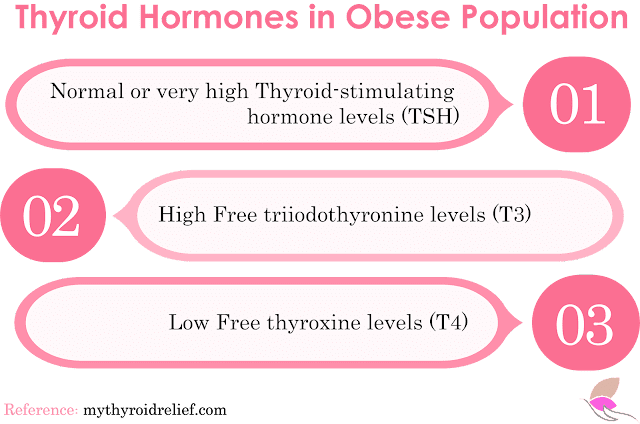
- Thyroid-stimulating hormone levels (TSH) are normal to slightly elevated
- Free triiodothyronine levels (T3) are high
- Free thyroxine levels (T4) are low
Intermittent Fasting And The Thyroid
This practice has roots in human evolution when access to food was unpredictable and periodic fasting was natural. Fasting is also practiced for spiritual reasons across many religions, including Christianity, Islam, Buddhism, Judaism, etc.
Fasting seems more natural and healthy than having three meals and snacks daily.
The Fasting Methods
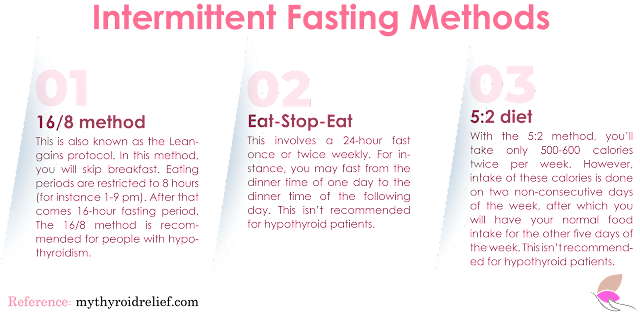
Intermittent fasting includes various methods that alternate between fasting and eating periods throughout the week. During fasting periods, you can’t eat food, but you can drink water, unsweetened tea, or coffee. Here are some popular intermittent fasting methods:
Fast for 12 Hours a Day:
This method involves fasting daily for 12 hours, typically from 7 PM to 7 AM, including sleep. It’s easy for beginners to manage and is recommended for people with hypothyroidism and Hashimoto’s because it can help regulate blood sugar levels, improve insulin sensitivity, and support weight management.Fasting for 16 Hours (16/8 Method):
The 16/8 method involves fasting for 16 hours and eating during an 8-hour window, such as eating between 12 PM and 8 PM and fasting from 8 PM to 12 PM the next day. This extended fasting helps with metabolism, reduces cholesterol and glucose levels, and provides significant health benefits. It can be beneficial for people with hypothyroidism and Hashimoto’s, but it should be done under medical supervision and with regular testing to avoid issues with thyroid hormone levels.Fasting for 2 Days a Week (5:2 Diet):
In the 5:2 Diet, you usually eat for five days and restrict your calorie intake to 500-600 calories on the other two days, generally not consecutive, to allow the body time to recover. This method is not recommended for people with thyroid conditions because it can cause a slowdown in metabolism, exacerbating symptoms such as fatigue, weight gain, and difficulty losing weight. It can also cause fatigue and low energy levels.
What role does intermittent fasting have on the thyroid?
Intermittent Fasting and Hashimoto’s

Bad stomach ache because of Lactose intolerance.
So, how do you start intermittent fasting with Hashimoto’s?
- Consult your healthcare provider
- Your doctor knows all there is about your health. They are qualified to advise you on whether the diet is good for your health or not.
- Start slowly
- You should begin your intermittent fasting regimen with short fast schedules or protocols, for instance, 12:12 or 14:8 hours.
- If you switch from being a frequent and heavy eater to one who abstains from food for at least 16 hours a day, a lot of molecular mechanisms will be activated within your body, causing it to switch into starvation mode.
- This mode alters thyroid hormone production, which may place you at risk of weight gain.
- Know what you are eating
- Adjusting your feeding habits can cause a drastic change in your gut microflora. Eat a healthy diet in the right serving sizes. Sugar promotes the growth of bad bacteria, so it is important that you take in very little of it. Eat dark chocolate if you’re having a sweet tooth.
- Studies have shown that people who eat less than 50g of dark chocolate three times weekly at the most did not gain weight. What’s more? Dark chocolate has anti-inflammatory properties.
- Taking foods that contain inflammatory properties is counterproductive for intermittent fasting because your body will spend a lot of time (an average of 12-16 hours) repairing any correlated damages that have occurred.

- Exercise moderately Frequent or intensive exercising during intermittent fasting might cause quick depletion of your thyroid hormones. Exercise should be done moderately and at intervals.
- Watch out for food triggers
Are you experiencing food trigger flare-ups? Then try not to eat foods that contain wheat or dairy products. It is important to note that 7 in 10 Hashimoto patients have dairy or wheat problems.
If you eat foods that you’re allergic to during intermittent fasting, you’ll feel severely fatigued and unable to focus on your daily tasks.
- Beware of thyrotoxicity If you’re losing weight drastically or have palpitations and shaky hands, it may mean that you have a high concentration of thyroid hormones in your blood – higher than what your body needs. This condition is known as thyrotoxicity. Consult your healthcare provider as soon as you can.
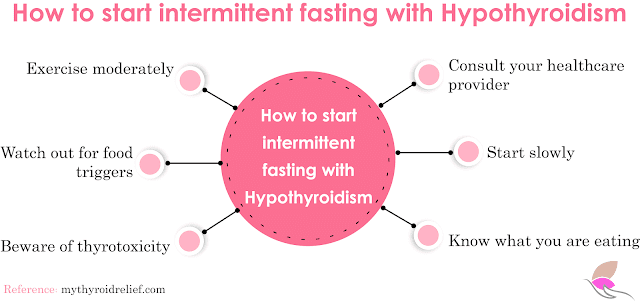
How it Affects your Hormones and your Cells
- Gene expression: There will be changes in the functions of genes associated with disease protection and longevity.
- Cellular repair: Cellular repair processes are initiated by your cells during fasting.
- Autophagy is one of these processes. Here, old and dysfunctional proteins accumulating inside cells are digested and flushed.
- Insulin: There is an improvement in insulin sensitivity and a drastic reduction in insulin levels. Low insulin levels increase access to stored body fat.
- Human Growth Hormone (HGH): HGH levels skyrocket by as much as 5-fold. This contributes to muscle gain and fat loss.
- Influence’s leptin sensitivity: Leptin is an important hormone that greatly influences appetite. A drop in your leptin level will trigger feelings of hunger and is believed to contribute to weight loss plateaus.Overweight or obese individuals have high leptin levels but are resistant to it. Conversely, lean individuals have low leptin levels but are very sensitive to it. Extended fasting leads to a loss of body fat. When this happens, leptin production will decrease. Recall that leptin is produced in fat cells. This means that there will be a decrease in the amount of leptin circulating in the blood.
- Studies have shown that leptin levels can fall very fast during fasting and one reason for this is a high appetite. Another study investigating the role of leptin in weight loss has found that the fall in leptin levels may cause overeating in some people.
Other changes that may take place include:
- Lower triglyceride levels
- Improve blood sugar
- Restore the concentration of ghrelin (also known as the hunger hormone) to physiological levels (normal levels). The changes in gene expression, cell function, and hormone levels all contribute to the health benefits of intermittent fasting.
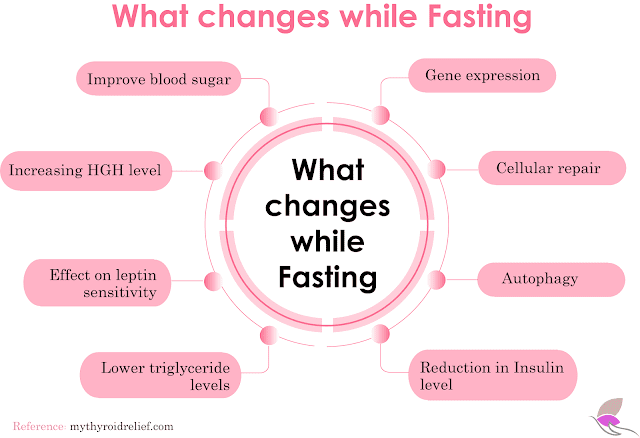
Interval Training
If you aren’t fit, you could alternate it with fast periods of walking. Let’s assume you are walking outdoors, you can increase your pace between trees, mailboxes, or other landmarks.

Effects of Exercising on Thyroid Hormone Levels
Why is interval Training Good for your Thyroid?
We’ve already reviewed the symptoms of hypothyroidism (underactive thyroid). Some of these symptoms include depression, heart palpitations, joint pain, and fatigue. We’ve also seen that hypothyroidism reduces metabolism, thus increasing one’s likelihood of weight gain.
It is important to note that interval training can relieve most of the symptoms associated with hypothyroidism, while also improving muscle mass and cardiovascular health.
- Increase your heart rate Untreated hypothyroidism can reduce cardiac fitness. Hypothyroid patients also have a high risk of ventricular arrhythmia (fast heartbeat). Exercise is vital to strengthening the cardiovascular system.
- Protects the joints
- Muscle building Now, hypothyroidism has a reducing effect on the body’s metabolic rate. This implies that hypothyroid patients are more likely to experience weight gain. But these effects can be counteracted by building muscle via lifting weights.
Engaging in activities like brisk walking, running, or a sport can greatly boost your cardiovascular health. What’s more? Interval training and exercise also have mood-uplifting benefits which relieve hypothyroid symptoms like fatigue and depression.
Hypothyroid patients frequently experience joint and muscle pain. Low-impact exercises that reduce stress on the hip, knee, or back joints may be easier to do compared to strenuous activities. Examples include swimming, walking, biking, and yoga.
Other benefits of lifting weights include:
- Improves body composition
- Physical fitness
- Increases bone density
- Prevents injury
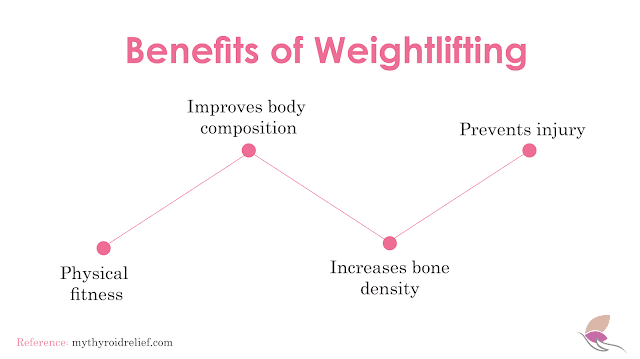

Conclusion
Studies have shown that despite medications prescribed, hypothyroid patients may still feel some form of discomfort during exercise.
However, when practiced within safe limits (as in interval exercises), the hypothyroid individual may benefit immensely from the therapeutic effects of exercise. As such, you must discuss your goals and exercise plans with your healthcare provider before beginning a new regimen or routine.
Thank you for sharing this valuable information on your blog! For those with thyroid conditions, understanding how practices like intermittent fasting can positively impact their health is incredibly important. The insights into weight management, cellular repair, and overall metabolic health offer practical ways to enhance long-term well-being. Your efforts in providing such helpful content are greatly appreciated.